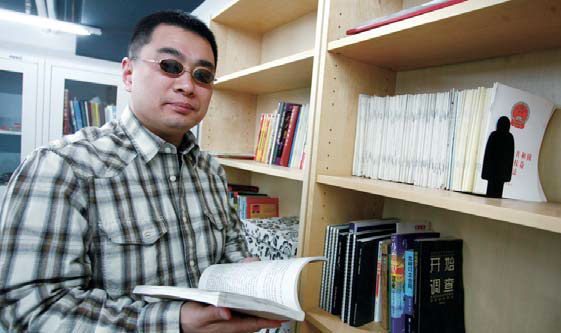He targets counterfeit goods for profit

Consumer activist is pioneer in Making a living by forcing manufacturers of fakes to pay for misdeeds
Wang Hai says he shies away from family gatherings, and wears sunglasses as often as possible.
The 42-year-old consumer activist says he is well aware of the risks involved with his trade - purchasing brand name products he knows to be counterfeit then going after the manufacturers to seek financial compensation. He also helps companies pick on their competitors.
| Wang Hai often wears sunglasses to protect his identity and reduce the risk associated with his career of profiting from exposing counterfeit goods. Tong Yibo / For China Daily |
"This is all about risk management. The more companies I target, the more risks I am faced with. I need to minimize the risks," he says.
Wang currently has four companies based in Beijing, Tianjin, Nanjing and Shenzhen, all of which specialize in turning a profit through compensation from counterfeit product producers.
His company buys and tests products, and matches product details with advertisements to find discrepancies.
In 2014, his four companies spent 2.02 million yuan ($317,800) to purchase 1,444 batches of fake goods, and with that made a profit of more than 4 million yuan.
The fight against counterfeit products "has nothing to do with justice. It is a noble act only because you can make money. The more money you can make, the better job you are doing," he says.
"I like targeting big companies because they can be more deceitful to consumers, and the harm of their counterfeiting behavior can be more far-reaching," Wang says.
A native of Qingdao, Shandong province, Wang started his professional career against counterfeit products in March 1995, when he sought to purchase two headsets at a shopping mall in Beijing before he realized they were counterfeits.
He went on to buy another 10 headsets, and later tried to get double what he paid from the shopping mall under the consumer rights protection law.
"I am the sort of person who always wants to see things through. The process is filled with challenges, and I enjoy those challenges," he says.
Wang's profit-driven motives have long been controversial and critics have accused him of choosing targets that provide big revenue potential while deliberately ignoring small counterfeiters.
In 2009, an online post in the Tianya Club forum accused him of blackmailing major industry brands. Wang filed a libel lawsuit against the forum in the Beijing Chaoyang court, but the court rejected his claim, ruling the post was removed in a timely manner, the Beijing-based Legal Mirror newspaper reported.
Wang has lost at least a dozen lawsuits over the years, including some filed against industry giants P&G, Coca Cola and China Mobile.
After two decades, he says there has been barely any improvement in the country's consumer rights protection.
"Consumer rights groups still barely have their voices heard," he says. "Trade unions representing the interests of companies are drafting laws and regulations that ignore consumer rights."
Meanwhile, there are few independent agencies that test products and present objective and impartial test results for consumer goods, he says.
"It is increasingly difficult to get the products tested by third-party agencies. Many agencies are bankrolled by companies and present fake test reports for them."
Two decades later, Wang is not the only one in the game. There are now hundreds of other companies doing the same, trying to make a profit through the purchase of counterfeit products. But Wang says he has never felt the pressure of competition.
"It is a good thing. They are virtually supervisors of consumer rights for free. They can spur enterprises to expand their business through innovation, rather than unfair competition," he says.
China's legislators have stepped up efforts to protect consumer rights, including a newly amended consumer rights protection law and advertising law.
xuwei@chinadaily.com.cn
(China Daily European Weekly 10/16/2015 page31)
Today's Top News
- Japan tempting fate if it interferes in the situation of Taiwan Strait
- Stable trade ties benefit China, US
- Experts advocate increasing scope of BRI to include soft power sectors
- New engine powers cargo drone expansion
- China to boost green industry cooperation
- Manufacturing PMI rises in November































